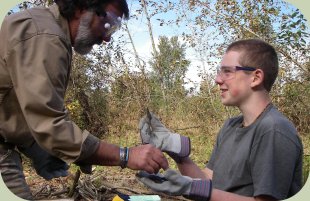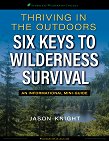Becoming a Good Nature Instructor

By Allan Sande
Allan "Hawkeye" Sande is a nature instructor and was the founder/director of Quiet Heart Wilderness School. Quiet Heart is a wilderness education program designed to reach out to our youth, age's preschool through 19. Hawkeye shares his beliefs and techniques based on his over 20 years of experience on what makes a good youth wilderness instructor.
What makes a good youth nature instructor?
We all have our own style and techniques but really, what makes one instructor better than another for working with young people? We are already assuming that this nature instructor is compassionate, caring, understanding of student needs, loves to teach and is safety conscious. But other than all these issues what is the difference?
I believe it is attitude, energy, and personal philosophy. The attitude of wanting to be there every moment for the student, the energy to be in the moment for the student and the personal philosophy to create a lasting learning experience for the young student, these are what make a great nature instructor.
The following points rank high in the style of teaching being done at Quiet Heart. These are issues that run deeper than in a learning situation. Many are building blocks for a student to live and grow by and most can be loosely intertwined.
First of these and the most important, is RESPECT. Teach respect. Practice respect. Respect the student and remind them to be respectful. Teach them to be respectful of themselves, other students and the leaders. Respectful of their personal items and ultimately and most importantly respectful of the natural world. Why is teaching the student to respect his backpack critical? The backpack becomes a symbol showing the lack of knowledge of where it comes from. No not the stores, but the materials that were removed from Mother Earth. It also represents their respect for their parents or elders who worked hard to make the money in order to purchase it. Gaining this knowledge of the process of obtaining things brings us back to the basics, essentials of life and to Mother Earth.
"You cannot be thankful without respect and you cannot be respectful without being thankful."
We also have very high expectations of our students, not to be great trackers, survivalists or plant experts, although they might in the future, but to follow the rules, be respectful and practice safe activities. We don't ask them, we expect them and they respond to this. We treat them as a responsible person.
In today's world where so many young students spend so much of their time indoors in a sheltered environment we give them responsibilities that most of them have never had before. We give them the responsibilities to carry and use a knife, to build, maintain and work around fire, to cook on that fire and to make their own decisions. Sometimes those decisions may require counseling and advice from an elder but needless to say, they make the decision. The idea of not being told what to do all the time is often a new experience for these young people. We try not to over protect them. Natural consequences can be a much better lesson than any talks by an elder. In a safe controlled outdoor environment, as much as it can be when one is in the woods, we allow them to make their own decisions. If that decision was bad then the universe will teach them through natural consequences, if it was good we congratulate them for doing a good job. To some folks today this might seem harsh but this is a much more natural and enduring way to learn. Every experience, whether it is good or bad, is a lesson to learn from. Children really do want boundaries; just make them fair and broad enough for them to fly. Allow them to spread their wings, allow them to fall, allow them to fail. Don't set them up for failure, set them up to succeed, and let it be their success.
A good youth nature instructor needs to be vibrant and animated, to sing, to dance, tell stories and sometimes to put on a show to keep their attention. Learn to use your arms to express yourself, to change your body language to make a point, to change your voice and the cadence of your speech.
Be More Prepared For Your Next Outdoor Adventure!

Don't leave home without knowing these six essential survival skills. Our free survival mini guide reveals the strategies of:
- Shelter & fire to prevent the number one cause of death
- Obtaining clean water to avoid life-threatening dehydration
- Common wild survival foods and other critical skills!

When working with adult students a nature instructor is judged on their knowledge, skills and presentation. When working with young students it is your energy. Keep their attention, get them involved and then you can teach them something important. Be mystical, dress the part, take a woods name; these are the things that will capture a child's imagination. Create that spark, light that fire; inspire them to be a child of the woods.
Finally, there is a big issue that our present society seems to be lacking in, and that is ritual. All of our ancestors had many rituals that they participated in throughout their life. Today we have few moments that are marked by ritual in our life. We need more. We need a ritual to give us a marker in our personal history to base memories on. We need ritual ceremonies to celebrate. We need rituals to give thanks. Young students embrace and thrive on these new rituals that we present them. For these reasons and more, we try to encourage the use of a lot of rituals. Every morning we offer a morning blessing of thanks, we have sacred areas at our camps where the students respectfully bury any dead creatures that are found. We have Thanksgiving Rock where we leave gifts of food to the animals. We have closing ceremonies and graduation of achievement ceremonies. These rituals of ceremony have become very important to our students and give them a reference of a moment in their life. Often these ceremonies become some of the highlights of their experiences with Quiet Heart. Perhaps, the overall message here for prospective nature instructors is to stay in the moment and perhaps capture the enthusiasm of your own youth; it really helps! See you in the Woods!
-Hawkeye
Additional Resources:
Outdoor Education Courses at Alderleaf
By the way, when you're spending more time in nature it's important to know how to stay safe in the outdoors, especially if you were to get lost. Right now you can get a free copy of our mini survival guide here, where you'll discover six key strategies for outdoor emergencies, plus often-overlooked survival tips.

About the Author: Allan Sande taught wilderness skills for over twenty years. He founded Quiet Heart Wilderness School and was an adjunct teacher at Alderleaf. Learn more about Allan Sande.
Return from Becoming a Nature Instructor back to Teaching Articles
Is The Essential Wilderness Survival Skills Course Right for You? Take the "Online Survival Training Readiness" Quiz
See for yourself if this eye-opening course is a good fit for you. It takes just a few minutes! Get your Survival Training Readiness Score Now!

Grow Your Outdoor Skills! Get monthly updates on new wilderness skills, upcoming courses, and special opportunities. Join the free Alderleaf eNews and as a welcome gift you'll get a copy of our Mini Survival Guide.

 The Six Keys to Survival: Get a free copy of our survival mini-guide and monthly tips!
The Six Keys to Survival: Get a free copy of our survival mini-guide and monthly tips!
Learn more